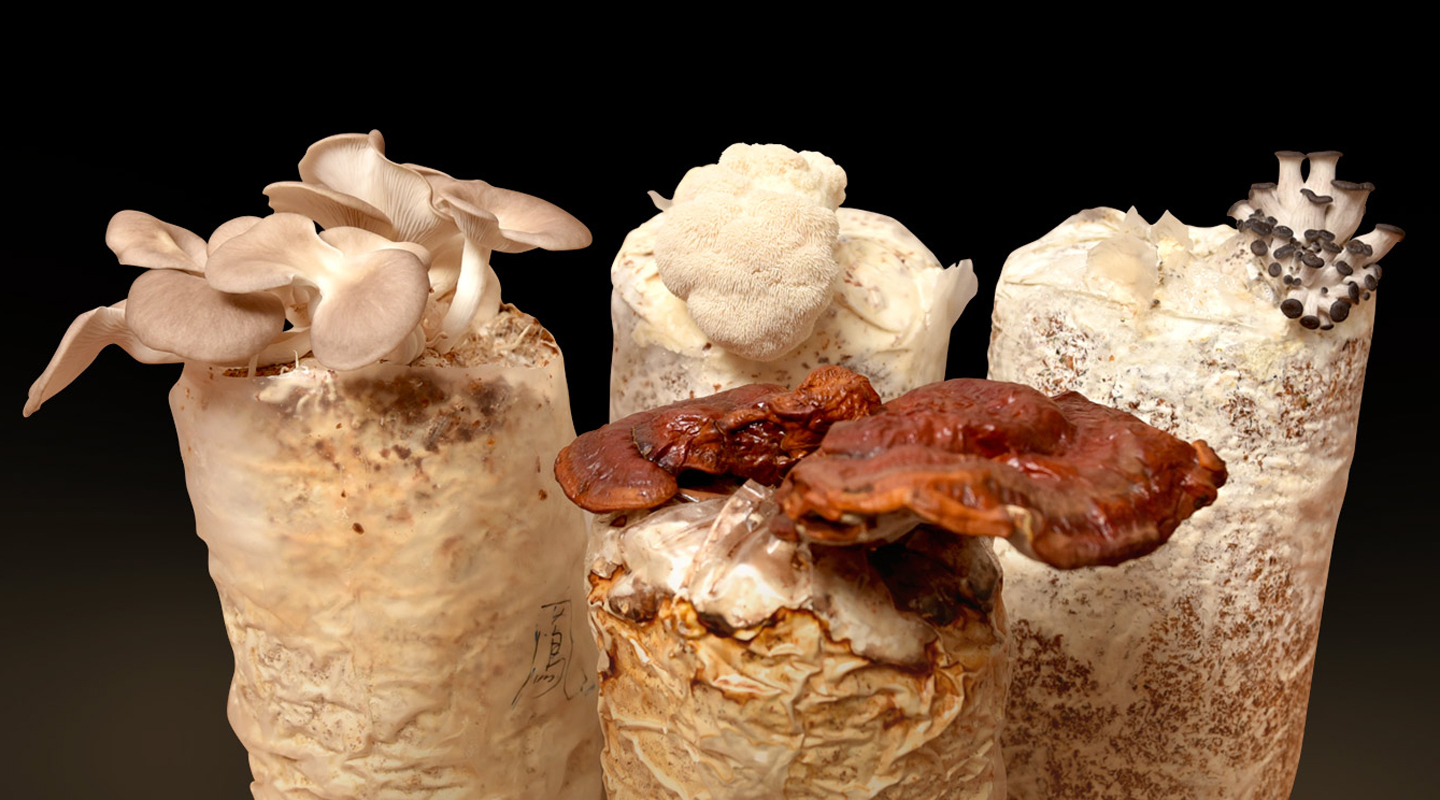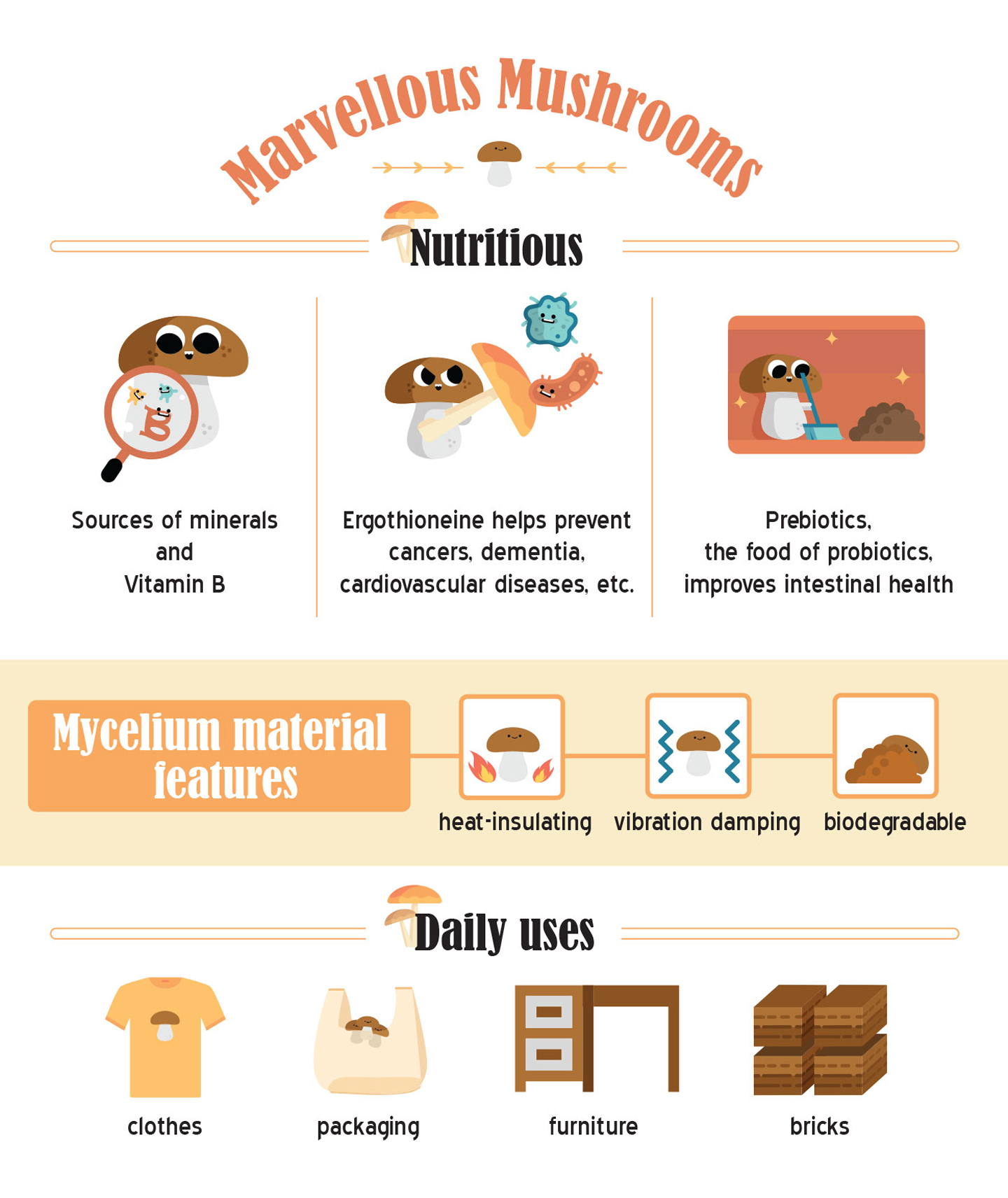Mushroom Impossible
Kwan Hoi-shan and his team’s fungi enterprise

Mushrooms, a food source that goes back as early as the Palaeolithic Period, are known for their aroma. Jun Pu (Mushroom Treatise) published in the Song dynasty records that mushrooms germinate from spores. The Ming naturalist Li Shih-chen found that mycelium grows out of Poria. According to Prof. Kwan Hoi-shan, mushrooms belong to the fungi kingdom, on the same biological footing as animals, plants, bacteria and archaea. They propagate by spores and survive with mycelium.
Professor Kwan has dived into the world of mushroom research for over four decades. He is Research Professor of CUHK’s School of Life Sciences, Director of Food Research Centre and co-founder of Mushroom-X founded last March. Firmly believing in much good can be done by mushrooms to the world, the ten-odd Mushroom-X members from the School of Life Sciences have been tireless in developing high-quality edible mushrooms and biomaterials, and sowing the seed of sustainable living in the community.
The Magical Mycelium
Without chlorophyll, mushrooms cannot derive nutrients through photosynthesis. They instead get the necessary nutrients by parasitism, saprophytism or symbiosis. Professor Kwan explained with saprotrophic fungi: After maturation, the spores will disperse and develop into mycelium in suitable conditions. The mycelium will release enzymes to decompose branches, fallen leaves, animal carcasses, etc., to obtain nutrients and grow. He said, ‘The largest organism on earth isn’t the blue whale but Armillaria solidipes in Oregon, US. Its mycelium keeps growing underground and covers an area of 965 hectares, which is equivalent to 1,350 standard football fields.’
The fruiting body of mushrooms usually serve as food, but the mycelium is more versatile. It can be used for making biomaterials, and even to replace plastic and bricks. The team collects composts, coffee grounds, bean dregs and wood chips and mix them with cultivated mycelium, which will grow to fill the entire container after absorbing the nutrients. The mix-and-match of various containers, species and nutrients will cultivate biomaterials in different sizes and textures, which are nonflammable, heat-insulating, vibration damping and biodegradable, ideal for product packaging and thermal insulation for buildings.

Some US companies attempt to replace bricks with the new material, but would have to put them in an oven to kill the mushrooms with intense heat because fruiting bodies will grow on the mushroom bricks. The Food Research Centre, however, has developed a new technology that suppresses the fungal bricks from further vegetating while keeping the mycelium alive. The material can self-repair once the fungal brick cracks. The team has obtained a provisional US patent and will look for an industry partner for joint production.

Gastronomic Delight
Climate change has led to crop losses. Professor Kwan believes that mushrooms could alleviate food shortage, and provide vital nutrients like high-quality proteins which are easily absorbed by the body. They contain ergothioneine, an antioxidant instrumental in the prevention of cancers, dementia, cardiovascular diseases and, more importantly, it won’t be lost in the cooking process. Their prebiotics are the food of probiotics which improve the intestinal environment for better health.
Crystal Ng, CUHK biology graduate and the first full-time staff of Mushroom-X, added, ‘We’re familiar with the four flavours of sweet, sour, bitter and spicy. Mushrooms give us the fifth: umami. It is a natural seasoning that stimulates our taste buds, and helps improve the appetite of the aged with impaired taste.’

The Mushroom Germplasm Bank, a legacy of Professor Kwan’s teacher Prof. Chang Shu-ting, has more than a hundred mushroom species. The bank enables the Mushroom-X team to identify and select the ideal species for local planting, and cultivate the species in appropriate temperatures and humidities to enhance production. Food safety is very much ensured by monitoring the production process ‘from gene to table’ with no chemical fertilizer or pesticide.
Practice Makes Perfect
Mushroom-X adds an ‘A’ to ‘STEM’ to make STEAM education (art is added to science, technology, engineering and mathematics). The team has been teaching secondary and primary school students spore print artwork production and sustainable farming of mushrooms, bringing them closer to nature. Mushroom-X co-founder Beatrice Ho said, ‘Some students learned to appreciate the beauty of mushrooms and nature from recognizing the uniqueness of spore print. We then let them see the importance of environmental protection. Such experiential learning is more effective than textbook learning.’

Members have developed confidence, team spirit and communication skills in promoting mushrooms. Helen Lai attributes it to Professor Kwan’s encouraging them to participate in entrepreneurship and innovation competitions. From the ‘Challenge Cup’ National Competition Hong Kong Regional Final, Vice-Chancellor’s Cup of CUHK, Nanshan ‘Entrepreneurship Star’ Contest to the ‘Chuang Qing Chun’—China College Students’ Entrepreneurship Competition joined by 150,000 student teams nationwide in 2018, Professor Kwan and Beatrice had offered guidance on business proposals, presentation slide design, delivery skills, etc. With the team’s solid practice in the community and excellent presentation, their project ‘Mushroom for the NeXt’ impressed the judges and won the Gold Award in the ‘Chuang Qing Chun’ social entrepreneurship category, the only Gold Award won by a Hong Kong team.
Founded in 2017, Mushroom Social Project offering mushroom education on campus is a prototype of the social enterprise. The project received HK$400,000 from CUHK’s Sustainable Knowledge Transfer Fund last year to set up Mushroom-X. The Fund is the first social enterprise seed fund among the local institutions, supporting CUHK practitioners to translate their research discoveries into social enterprises to benefit the community with sustainable business models.
The path of social enterprising is long and winding. Beatrice reflected on the difficulty in striking a balance between self-financing and social benefits. ‘But we will face the challenges with an unbending will,’ Professor Kwan added. The team now relies on the profit from STEAM education and other startup funds to support their product and fungal technology development. They will keep perfecting their business model and ‘spreading the spores’ of mushroom value and sustainable living in the community.

J. Lau
This article was originally published in No. 535, Newsletter in Apr 2019.

